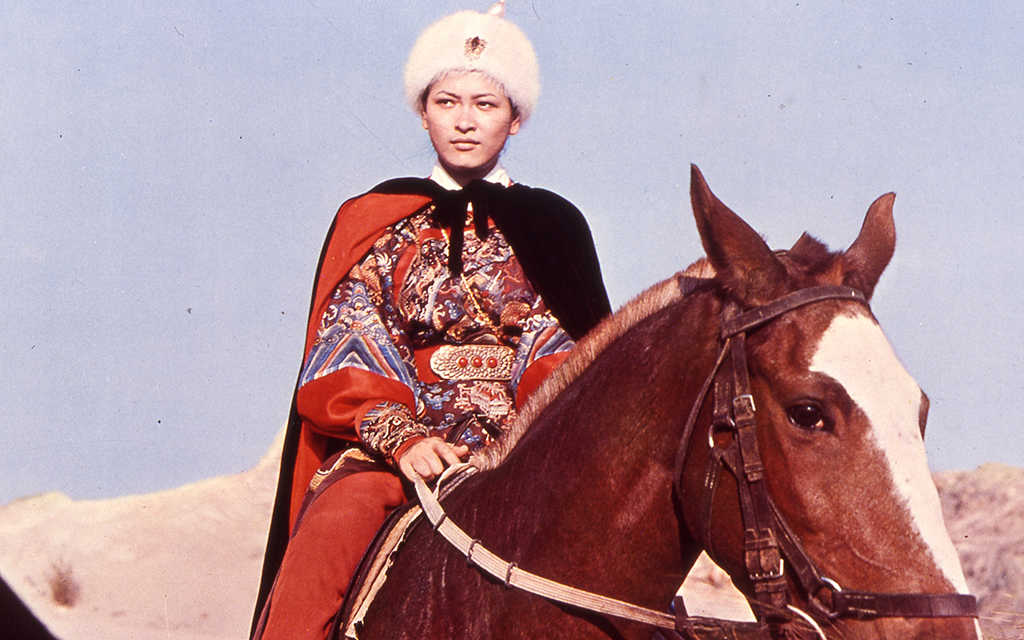By Andrew Hamlin
Northwest Asian Weekly

Screen capture from “The Fate of Lee Khan” (Photo from Northwest Film)
King Hu, master of the wuxia (“martial heroes”) form of historical-epic Chinese martial arts film, had considerable cachet after his film, “A Touch of Zen,” finished in 1971. His next full-length project, “The Fate of Lee Khan,” would take the fists-and-feet fury in another direction.
“The Fate of Lee Khan,” released in 1973 and coming soon as a reissue to the Northwest Film Forum in Seattle, featured women in most of the lead roles, showcasing the acting and fighting talents of several ladies on their way up in the industry, or who were already at the top. So having many women up front was a rarity in such films, and Hu made the most of his cast.

Screen capture from “The Fate of Lee Khan” (Photo from Northwest Film)
“I became aware of the film in research with regards to upcoming restorations,” said Northwest Film Forum programmer Amanda Salazar, who put the film into the Forum’s schedule. “The distributor Film Movement, had just announced the new 2k restoration.”
Salazar watched the film from her own home, to size it up. She was instantly impressed, although, she allowed, it will surely look even better on the Forum’s big screen.
“My initial thought was, ‘Badass!’” she enthused. “Seeing a group of women run, operate, and fight within the setting of an inn was so fun and dynamic. The story, the costumes, and of course, the martial arts choreography [from Hong Kong legend Sammo Hung] is incredible.”
The story, written by Hu himself with Chung Wang, concerns Lee Khan (played by Tien Feng), an official working for Mongolian Emperor Yuan of the Yuan Dynasty. He procures the battle map of the Chinese rebel army, which, if delivered to his superiors, guarantees them success against the rebels, who fight to restore the rival Han dynasty.
A crack team of Chinese resistance fighters moves in to foil Khan. They get unlikely help from an undercover all-female gang working within Khan’s ranks to undermine him.

Screen capture from “The Fate of Lee Khan” (Photo from Northwest Film)
The female leads include Li Li-hua, daughter of a famous Beijing Opera actor who herself studied the performance and acrobatic traditions of Beijing Opera from an early age; Angela Mao, aka “Lady Whirlwind,” raised on acrobatics and hapkido, discovered and put into movies when she was just 17; and Feng Hsu, who bounced between Hong Kong and Taiwan, getting her breakout role in King Hu’s earlier movie “A Touch of Zen.”
“This is another great film within Hu’s canon of work,” said Salazar. What I particularly like about this one is the setting for most of the movie: The inn. It provides a cramped but dynamic space for the characters to interact within, so the story is easy to follow, but also tense.”
King Hu had, to his credit, used dynamic and self-sufficient women in lead roles before.
But this particular combination, working together as a team, left two distinct impressions reverberating down successive decades. First, fighting females were here to stay. Second, they demanded, and deserved, as much respect and as much exposure, as producers and directors could give them. Action movies would never be the same.
“The Fate of Lee Khan” plays April 10–12 at the Northwest Film Forum, 1515 12th Ave., Seattle. For prices, tickets, and showtimes, visit nwfilmforum.org/films/fate-of-lee-khan-king-hu.
Andrew can be reached at info@nwasianweekly.com.



